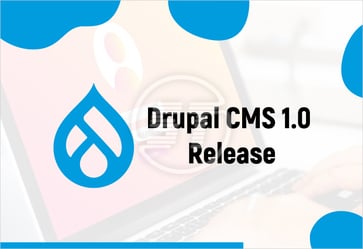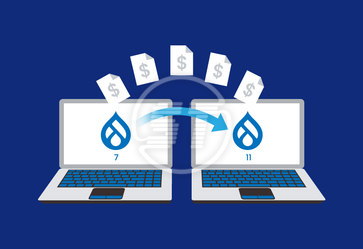Governments are approaching to automate activities and processes containing personal data of citizen; they also require delivering updates on latest policies, actions, programs as well as spreading awareness regarding various initiatives. It requires sturdy security, privacy, and smooth performance. To elevate quality of government systems and deliver an omnichannel experience to all the citizens, a content management system (CMS) with advanced features is the basic requirement.
Selecting a content management system like Drupal is one of the efficient ways for governments to update their constituent’s digital experience.
As per several research and surveys, among myriad available CMS options, Drupal has become the government's preferred choice due to its scalability, open-source availability, robustness, and many other future-proof features.
YOU MAY ALSO LIKE: How much does a Drupal website development cost?
What matters the most for the governments?
- Personalization capabilities.
- CMS which is cost-effective, has compliance, inclusivity, and security.
- Easy to use for non-technical users and citizens.
- Omnichannel content delivery and rapid updates enablement.
- Constituents don’t want a generic, one-size-fits-all experience.
- Easy governance configuration for media, data delivery, navigation, information sharing, etc.
In 2009, whitehouse.gov and all its related websites (from 2009 to 2017) chose Drupal to build incredible digital experiences. In 2021, approx. 56% of the world’s government websites were using Drupal. The countries like Australia, France, Germany, Estonia, India, South Africa, etc. have their central government and other official portals/websites on Drupal.
A few major jurisdictions that have Drupal websites including Washington DC, New York State, New South Wales, London, Los Angeles, Northern Ireland, Western Australia, and more can be cited. World Bank also switched its website to Drupal in November 2022. Canada has around 25% of its government websites on Drupal.
Why is Drupal a top pick for government and public sector websites?
Drupal is a content management system with built-in key features that can fulfil government websites main requirements:
- Cyberthreats are the biggest bottlenecks for government websites. Governments are expected to ensure a secured digital environment for their citizens and Drupal helps in maintaining the trust and safety of crucial data.
- Various laws, security protocols, and legal mandates are to be applied on government’s online content and services. Drupal has features to protect website’s compliance without hampering its performance.
- Government websites must be flexible and scalable to offer an array of public services with proper traffic management. Drupal makes all this possible.
- Many jurisdictions ought to adhere to WCAG standards to maintain website accessibility, to serve citizens with disabilities, and Drupal is meant to offer accessible solutions.
Read the next section to understand more on Drupal’s features.
How can Drupal CMS solution accelerate the digital growth of government websites?
Drupal supports solutions for content authoring, content structure, ecommerce features, API-driven development, etc. Some of the reasons that make Drupal suitable for government websites are:
Seamless development and integration
Drupal is an open-source CMS and the perks of being open source are incredible. The most noticeable benefit is that community member including developers and companies keep contributing to the platform, which ultimately improves its functionalities with time and provides frictionless development.
Moreover, government operations require smooth integration with several third-party systems and tools. Drupal has an API-first approach, which makes such integrations simple and secure.
The CMS can integrate with:
- CRM systems
- Analytics tools
- Customer data platforms (CDP)
- Identity providers (IDP)
- Digital experience platforms (DXP)
- Marketing automation platforms.
YOU MAY ALSO LIKE: Drupal for ecommerce business
Effective Website Strategy
For a website that wants to engage its users, it is important to have a proper strategy to build and operate all its functions. Personalized content with proper structure is what every user expects now, and Drupal has core and contributed modules to create custom content types.
Drupal supports the most heavily trafficked websites like nasa.gov. Government websites have vulnerable use cases in terms of breaking down during peak traffic hours.
Drupal has built-in multilingual features to manage multiple language websites, which is one of the mandatory requirements for government websites.
Also, with Drupal’s multisite feature, governments can manage multiple sites effectively with a single codebase. Thus, all these and several other features of Drupal help governments to make an efficient strategy for a successful website.
User experience strategy
Drupal is a customer-centric CMS that offers built-in personalization modules to provide the right user experience. Additionally, its improved caching functionality speeds up web page loading. It has layout tools that enable the creation of landing pages with rich UX and the reusing of content for distinct marketing campaigns. Therefore, making an appealing user experience strategy is possible with Drupal.
Security
A CMS ought to adhere to some defined government standards for security such as FedRAMP, CCPA, and HIPAA.
Drupal has security modules and assists government websites to maintain sturdy security by adhering to these standards. Login security, password policy, and regular security patches make the CMS apt for government websites by protecting them from malicious attacks and data breaches.
Website encryption using SSL, HTTP strict transport security, secure cookies, protection against SQL injection, and many other forms of security vulnerabilities are taken care by Drupal CMS. Find more information about Drupal security best practices.
Front-end theming
Drupal contains an amazing subset of accessible, responsive themes that can provide unforgettable experiences to users. The base themes have built-in advanced features, and they can be implemented and customized swiftly to predetermine the layout of the website. By leveraging Drupal’s potential to create front-end and other themes, government organizations can develop an attractive and usable website.
Custom module building
Drupal has modules and distributions such as OpenPublic, Drupal voor Gemeenten, govCMS, aGov, etc. to achieve government site functionalities. These modules are important for government websites to create segments like recent news, government strategies, announcements, government plans, etc. The modules are accessible to cater to the specific needs of government operations and Drupal has a unique capability to alter existing modules to meet prerequisites. The modules make the website development process quicker and easier.
WCAG 2.0, 2.1, and 2.2 accessibility remediation
Drupal accessibility features like Semantic mark-up support, HTML 5 & WAI-ARIA compatibility, accessible themes, etc. help meeting accessibility goals for government websites.
Industry best coding practice and infrastructure
Drupal consists of quality code that provides top-notch quality and consistency for websites. Modern development tools are used to enforce quality standards throughout the website/application made on Drupal.
Its add-ons adhere to the industry's best coding practices and thus offer exceptional user experience. Also, automated code updates reduce potential user errors. Drupal also offers flexibility to choose among architecture like traditional, headless, and hybrid which help governments to transform their digital experience across the channels.
Drupal 10 headless open API
The headless capability of Drupal 10 is a boon for government websites because it enables to build future-proof solutions by integrating with other technologies for front-end development. Government websites can seamlessly integrate with third-party vendors if made on Drupal CMS.
Headless open API makes websites scalable and elevates their performance by enabling authorization, validation, content management, etc. at the Drupal backend perfectly. With the help of JSON objects, data exchange among different channels becomes smooth.
Agile delivery
Drupal is built incrementally to streamline its projects’ delivery. It has agile delivery approach which ensures continuous flow of valuable products and services to users, which is a basic need for government websites and portals.
Retainer and support
Globally, approx. 1.3 million community members support Drupal. The community helps resolve issues related to the platform’s performance and security.
Well, it seems selecting Drupal for government website development has profound and obvious reasons. Above-mentioned features and functions are enough to select Drupal for governments and even other sectors who want to build a robust yet flexible system.
How do we help as a Drupal Premium Support Partner?
We provide complete Drupal solution from design, development, migration, upgradation, maintenance, SEO, and more. Our basic principle is to provide diverse solutions without compromising the quality of the website. Our team pays meticulous attention to every detail to accomplish digital strategic success.
We have been contributing to Drupal’s distinct projects regularly and now as a Premium Supporting Partner of Drupal, we will be delivering more authentic Drupal solutions. Read more about our collaboration with Drupal. Reach out at [email protected] or request a free quote.


